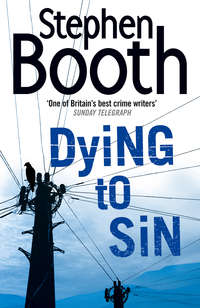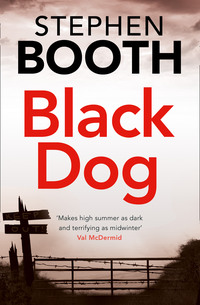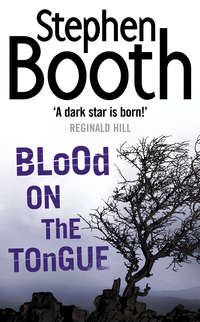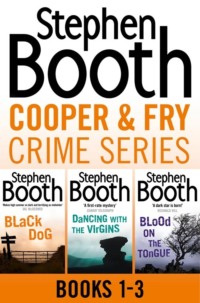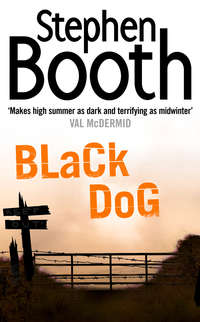
Полная версия
Blind to the Bones
Fry waited for one of them to say the same about Neil Granger, but they didn’t. Instead, the Renshaws glanced at each other again, passing some hidden message.
‘I understand Emma knew both of the boys from an early age,’ said Fry.
‘They both lived in Withens as children, so they went to the same school.’
‘So both Alex Dearden and Neil Granger were old friends of Emma’s. You knew them both well, and you were happy for your daughter to be sharing a house with them.’
‘We know them both,’ said Howard.
‘A set-up like that could be enough to cause stress in itself, in some circumstances.’
‘I don’t think Emma found it a problem. She is a very well-balanced girl.’
‘Apart from the stress she suffered because of the work and the exams.’
‘Yes.’
Mr Renshaw had been listening to his wife carefully. Now he looked at Fry. ‘She isn’t the sort of girl to kill herself,’ he said. ‘We’re quite sure of that.’
‘Oh, quite sure,’ agreed his wife.
‘Thank you.’ Fry sighed. She had noticed that every time she slipped up and used the past tense in referring to Emma, one of the Renshaws corrected her gently.
‘You realize there’s no reason why she shouldn’t come back,’ said Sarah.
‘It’s been over two years now, Mrs Renshaw.’
‘But there’s no reason why she shouldn’t come back.’
Howard Renshaw leaned forward with a smile, trying to look like a helpful intermediary, ready to calm the situation and smooth over the sudden tension.
‘There are plenty of young people who go missing for long periods of time,’ he said helpfully.
‘Yes, I know, Mr Renshaw,’ said Fry.
‘And many of them turn up again, safe and sound – sometimes after several years.’
‘Yes.’
‘And you know perfectly well that the police enquiries at the time found no evidence of a crime.’
‘No,’ said Fry.
But Howard Renshaw was sharp enough to catch her hesitation.
‘At least, that’s what they told us,’ he said, suddenly fixing her with an accusing stare.
‘There’s some new evidence,’ said Fry.
‘Evidence?’
‘I’m afraid Emma’s mobile phone has been found.’
‘Where?’ said Howard immediately.
‘In woodland a little way outside Chapel-en-le-Frith.’
‘Can you tell us exactly?’
‘I’d rather not at the moment, sir. Obviously, we want to examine the area thoroughly before we come to any conclusions.’
Sarah Renshaw was smiling. ‘Well, that explains why we were never able to contact her, if she had lost her mobile phone. I suppose it was stolen.’
‘Well, it’s possible,’ said Fry. ‘But there could be other interpretations. We’re keeping our options open.’
‘What are you saying?’
Fry could hear the rising note in Sarah Renshaw’s voice, and she began to feel uneasy. She was aware of Gavin Murfin shuffling on his chair next to her, as if he wanted to get up and leave the room.
‘I’m not trying to upset you, Mrs Renshaw. It’s just that we’re going to have to look at the circumstances again, and –’
‘And what?’
Sarah Renshaw was getting flushed. Fry desperately cast around for something to calm her down. She looked at Mr Renshaw, hoping for his placatory intermediary act right now. It didn’t come. But Sarah calmed herself with her own thoughts.
‘I lit a candle the night she didn’t come home,’ she said. ‘There’s been a candle burning for her ever since.’
Fry nodded, not knowing what to say, and decided to say nothing.
‘I need to make some initial enquiries,’ she said, ‘but then I’d like to come and see you at home, if that’s all right. Perhaps tomorrow.’
‘Tomorrow afternoon,’ said Sarah. ‘That would be fine.’
‘Will you be talking to Emma’s friends again?’ asked Howard.
‘Yes. I plan to start with Alex Dearden and Neil Granger.’
‘Alex is a nice young man,’ said Sarah. ‘I hope that he and Emma might get together some day.’
The Renshaws looked at the clock, and then at their watches.
‘We have to go,’ said Howard.
‘We’re going to wait for Emma at the underpass,’ said Sarah.
Fry stared at her. ‘Sorry?’
Sarah smiled and patted Fry’s sleeve as she stood up. ‘Don’t worry about it,’ she said. ‘We’ve been getting guidance.’
As soon as the Renshaws had left, Diane Fry got Gavin Murfin to pull out the files on them. Murfin had been right – it would have been helpful if she’d been warned beforehand. But everyone else in E Division seemed to know the whole story, so maybe they had assumed that she knew it as well. It was just one of those little breakdowns in communication that made life so frustrating sometimes. Probably everyone but DI Hitchens had also forgotten that she was herself from Warley, near to where Emma Renshaw had last been seen. Fry had spoken to very few people here in Edendale about her past. One too many, perhaps. But very few.
She supposed that Howard and Sarah Renshaw had been normal people once. Until that night two years ago, they had been a nice, middle-aged, middle-class couple living in their detached house in Withens. They probably had a barbecue patio and a holiday caravan at Abersoch, as well as a daughter studying for a degree in Fine Art in Birmingham.
There were a few little facts about them that Fry was able to glean from the files. Apparently, Howard had already been thinking of taking early retirement from his job as director of a major construction company in Sheffield. Maybe he had been wondering every morning whether his bald patch had grown too big to bother combing his hair over it any more. As for Sarah, she had been due to start a year as president of the local Women’s Institute. Probably she had been busy planning a series of events for her presidency, and calculating how much money she could spend on a wardrobe of new clothes.
One thing was for sure. Both of them had been looking forward to their daughter returning home from university for the Easter holidays, and they had invited their friends and neighbours Michael and Gail Dearden for dinner the following night to admire Emma’s achievements.
Now, though, the Renshaws had both become a little strange. Fry had seen for herself that they were a bit too inclined to those sudden stares and meaningful glances, to raised voices and flushes of colour, and to odd bursts of excitement, followed by dejection and tears.
But the files also recorded the fact that they had become a downright nuisance over the past twenty-four months, bombarding the police with theories and suggestions, pleas and demands, letters and phone calls, and dozens of personal visits to any officer whose name they could get hold of. They had repeatedly reported secondhand sightings of young women who vaguely resembled their daughter. Most worryingly, they had been picked up by traffic patrols several times after they had been found standing in the road, harassing motorists, asking questions that people didn’t like being asked. Twice the Renshaws had been brought in to be given words of advice.
And now they talked about getting guidance. It had turned out they meant guidance from some so-called psychic they’d been consulting, who was advising them where to look for Emma, and which roadsides to stand on at what time, in the hope of some miraculous encounter. Fry grimaced at the thought of the person who was taking advantage of the couple, ruthlessly exploiting their belief.
She supposed that the Renshaws were still a nice, middle-aged, middle-class couple with the house and a caravan. The difference was they no longer had a daughter. Yet they seemed to be living in a sort of alternate reality, where Emma was not only still alive, but perhaps simply planning to catch a later train from Birmingham. Two years later.
Diane Fry left the files open on her desk and walked to the window. From the upper floor of E Division’s West Street headquarters she could see part of the stand at the football ground and the roofs of houses running downhill towards Edendale town centre. Everything looked strangely clean and gleaming out there. But that was only because the slates of the roofs were still wet from the morning’s showers, and the dampness was reflecting the faintest vestige of sunlight penetrating the grey cloud cover. A bit of light could be so deceptive.
Fry shuddered, but not at the view from her window. There was one question in her mind. Could fear be avoided by simply ignoring the reality? Perhaps it depended on whether you were ever forced to accept what that reality was. Howard and Sarah Renshaw seemed to be going to great lengths to avoid the reality that their daughter was likely to be dead. Fry might have to be the one who forced them to face it.
Yet who was she to talk about facing reality? For years, she’d been perfecting her own techniques for doing just the opposite – burying the fear. Her own reality included a sister she hadn’t seen for fifteen years, ever since Angie had walked out of their foster home in the Black Country as a teenager, and the violent rape that had led her to transfer from the West Midlands to Derbyshire. And there were events in her more distant childhood that she didn’t even want to guess at. It was hard to pinpoint which of them caused the fear.
According to the therapist she had talked to, phobic behaviour was caused by fear conditioning, the need to avoid the triggers that had caused the fear in the first place. But it could be overcome by experiencing the triggers in a safe context – the process of cognitive behavioural therapy, a treatment for part of the brain the therapist called the medulla. He said new memories had to be created which would over-ride the fear. Extinction memories. A new life to replace the old one.
Fry had begun to imagine this process as being like painting a new picture over a previously used canvas. As a child and a young teenager, she had liked to draw. It had been something she could do alone, absorbing herself in her pictures in her room at Warley. But sometimes a finished pencil drawing had bothered her, and she had rubbed it out with an eraser. That had never seemed enough, though, so she would draw over it again, trying to create a happier picture on paper that was already grubby and smeared with charcoal from the old one.
Then a boyfriend had taken her into Birmingham City Art Gallery one wet Brum afternoon, to try to raise her cultural standards. There had been a special exhibition on, and it was there she had seen one of the visions of Hell painted by Breughel the Younger. There had been a lot of other stuff, too, but it had been the Breughel that impressed her. She had kept the memory of it for much longer than she had kept the boyfriend. He had lasted only a few weeks. But the vision of Hell was still with her twelve years later.
Now Fry imagined her fear as one of those Breughel visions, all demons and flames. With the therapist’s help, she had learned to cover her mental painting with a pastoral landscape rendered in gentle colours – brown and white cows grazing in a wildflower meadow, a cottage with clematis growing by the door, a cat relaxing in the sun on a window ledge. And always in her picture there was a young girl. She stood right in the middle foreground, clutching a wicker basket in her bare arms, smiling as she scattered grain for the hens around her feet.
The picture had stayed intact for a while. The cows had never seemed to run out of grass in their pasture, the sun always shone on the cat. And the girl had never aged, so that her skin had remained pink and fresh, and unbroken. Just like the photograph of Emma Renshaw.
But Fry’s picture didn’t have the advantage of photographic permanence. It had been done with cheap paints. After a year or two, the colours had worn thin. They were scoured away by the rubbing of her hands, by her constant touching and stroking to make sure the picture was still intact. When she had handled her picture too often, the Breughel showed through again. That was when she had to go back for help, to prevent the faces of the tormented souls emerging once more from the red petals of the poppies, to convince herself that the hooves in the grass were those of cattle and not goat-footed demons. She needed reassurance to make her see the leaves of the clematis instead of the flames leaping from the pit. She needed help to see the innocence of the girl, not the scaly claws of the birds at her feet.
Each time she had to lay the paint on thicker, layer upon layer of it, with a bigger and bigger brush and in brighter and brighter colours. Finally, the picture had become so garish that she could no longer see anything but what lay underneath. She saw only blood in the poppies, and mould in the grass. She saw the bones under the skin of the girl.
6
Ben Cooper and Tracy Udall found the Reverend Derek Alton in his churchyard. He’d taken a bit of finding, because he was almost invisible among the weeds and overgrown shrubs. Alton was wearing wellingtons and corduroy trousers, and he was clutching a scythe in gloved hands. Thistle burrs and bramble thorns had stuck to his trousers. Now and then, he took a half-hearted swipe at the weeds, flattening them, but not cutting through them. In between swipes, he paused and stared gloomily at the plants.
‘I think your scythe needs sharpening,’ said Cooper.
Alton looked up and wiped his forehead with the back of one of his gloves. ‘Yes, I know. But the sharpening stone has gone missing.’
‘In fact, don’t you think that the job would be a lot easier with a decent brush cutter? You could hire a four-stroke model, so that you wouldn’t have to trail an extension lead all the way out here.’
Alton looked at the scythe dubiously, then down at his feet. Cooper saw that there was a gaping slash in the rubber across the toes of one of the vicar’s wellington boots. Perhaps a petrol-driven brush cutter wasn’t such a good idea after all – not if he could nearly take his toes off with a blunt hand scythe.
The church was small and stone-built. But it was a dark stone, almost black, unlike the golden sandstone or the almost white limestone that had been used in other areas. Maybe it hadn’t always been black, but had been stained by soot from the steam trains that had travelled on the railway lines below ground here.
PC Udall went to take a look at the vestry, where Mr Alton had reported the break-in.
‘Is it your turn on the rota for tidying up the churchyard then, Mr Alton?’ said Cooper.
‘Rota?’ Alton laughed. ‘I am the rota.’
‘Oh?’
‘Other churches have rotas. My other church, All Saints in Hey Bridge – that has a churchyard rota. The graves are tended wonderfully, and the parishioners don’t expect the vicar to lift a finger, let alone wield a scythe. Here in Withens, though … Well, they’re too busy to spare the time, I suppose.’
‘Who are your churchwardens here?’
‘Michael Dearden and Marion Oxley.’
‘I’ve heard of the Oxleys.’
‘Good for you.’
‘But who’s Mr Dearden?’
‘Shepley Head Lodge. It’s out past the village, that way.’
‘Right.’
‘They’re both very worthy people, but they have their own concerns, you see.’
‘Of course.’
‘The trouble is, when we get the first bit of sunshine in the spring, this is what happens.’
Cooper looked around at the undergrowth. There were gravestones somewhere in there, but it was difficult to be sure. Mats of rough grass had grown over the plots, and brambles and ivy had attached themselves to the stones, so that few of the inscriptions were decipherable. He realized he was standing on what had once been a flagged path, but the grass and dandelions had forced their way through between the flags and covered them. Burgeoning nature was out of control here, and it was spreading nearer and nearer to the church itself.
‘So you have no help at all?’ said Cooper.
‘A young man called Neil Granger is going to help me. At least, he said he was going to. He said he had one of those things you mentioned, a brush cutter, and some other tools. But he hasn’t turned up. I don’t suppose he could be bothered in the end.’ Alton sighed. ‘He’s always seemed a very genuine young man, but there we are. It’s the way of the world these days. Young people think nothing of letting others down.’
‘I don’t think that’s true,’ said Cooper.
Alton suddenly looked at him again, and smiled. ‘Good heavens, a policeman who doesn’t have a cynical view of humanity. Let me tell the curators of the folk museum in Glossop about you – they might want to preserve you for posterity.’
‘Young people always get a bad press. But I don’t think they’re any worse than they used to be, on the whole. We should put in a bit more effort, take an interest in what they’re doing, instead of writing them off.’
‘You make me feel positively ashamed,’ said Alton. ‘It should be part of my pastoral duties to draw the best out of the young people in my parish, not denigrate them. I’ll do my best to emulate your attitude.’
If it had been anyone else he was talking to, Cooper might have thought they were taking the mickey out of him. If it had been Diane Fry speaking the same words, they would have meant something quite different. But, strangely, the Reverend Alton seemed sincere.
‘Take an interest in them – that’s what you should do,’ said Cooper.
‘I will. Thank you.’
Cooper felt sure he was being patronizing. It was ridiculous to find himself lecturing a clergyman on showing an interest in his parishioners. But the vicar genuinely didn’t seem to mind. Probably he had received far blunter advice from his parishioners.
‘PC Udall tells me there have been some problems in the village with the children of the Oxley family.’
‘I’ve had to complain to their father a few times,’ said Alton. ‘They do tend to gather in the churchyard in the evenings – particularly at the back here, because it’s completely secluded and no one can see what they’re up to.’
‘And what are they up to?’
‘I shudder to think sometimes. I regularly pick up beer cans, and that kind of thing. They cause a bit of damage, and there’s some graffiti. It’s just a nuisance, really.’
‘But you find their father co-operative?’
‘Lucas? He listens. And so does Marion, of course. But I’m not sure how much control they have over some of the children.’
‘How many children are there?’
‘Oh,’ said Alton vaguely. He looked at the fingers of his gloves, as if he needed something to count on, but couldn’t find enough fingers. ‘There are so many of them down at Waterloo Terrace. Lucas has at least three sons – Scott is the eldest, and then there’s Ryan and Jake. And possibly Sean. Then there are a couple of married daughters. Well, one is married, but I don’t think Fran has ever bothered. And Lorraine and Stacey are the younger girls. But there are some cousins around, too, like Neil. He’s a Granger, but I think he’s Lucas Oxley’s nephew. It’s hard to keep track, you know – especially if you see them all in a group. Very often, I can’t sort out which is which, except for little Jake, of course.’
‘Jake – is he the one they call the Tiny Terror?’
‘Yes, poor boy. Now, I think Jake pays more attention to his grandfather than to his parents. That’s old Mr Oxley. It’s quite surprising, really, since Jake is only nine years old, and Eric must be about eighty. But perhaps Jake is going to take after his grandfather one day. We can but hope. Eric was a hard worker in his day, by all accounts.’
Cooper was having as much difficulty as Alton in counting the number of Oxleys. He had Lucas and Marion placed as the parents, but he’d already lost track of the number of children. Was it seven or eight? There were Scott, Ryan and Jake, but did Sean count? And how many cousins were there? Did the married daughters have children of their own? It was confusing enough, but now there was an older generation to take into account.
‘Is old Mr Oxley a member of your congregation here at St Asaph’s?’ he asked.
‘Sadly not.’
‘I’m surprised. I felt sure he would be. At his age, he would have been raised in the expectation that he would go to church every Sunday. Unless he’s a nonconformist, of course. There are a lot of Methodists in these parts.’
‘Wash your mouth out,’ said Alton, and smiled down at his scythe.
‘Is he a Methodist?’ asked Cooper.
‘I wouldn’t know,’ said the vicar. ‘I haven’t had the chance to ask him. Eric Oxley hasn’t spoken a word to me since I arrived in the village. Though I’ve passed him on the road several times and spoken to him, he’s never acknowledged me, never spoken to me at all.’
‘Not a word?’ said Cooper.
‘Not a word.’
‘Mr Alton, do you think the Oxley youngsters were responsible for breaking into your vestry?’
Alton sighed. ‘I really don’t know. They’re obvious suspects. But it’s a bit beyond what they normally get up to. They’ve never got inside the church before. There’s some quite serious damage to the doors and the furniture. And, of course, there are several items missing. They’ve never stolen things before.’
‘Some silver plate, I understand?’
‘Yes. Oh, they were nothing much, but they were the only things we have of any value at St Asaph’s. They were a gift from one of the founders, back in the 1850s.’
‘It’s quite possible we might be able to get them back.’
‘It’s kind of you to give me some hope.’
‘Not at all.’
‘If it turns out that it was the Oxley youngsters, what I really hope is that someone will find a way of halting their slide into criminality before it’s too late. The boys are getting older. Scott is quite a young man now, and so is one of his cousins. Glen, I think they call him. They’re not a good example for the younger ones. Sooner or later, something more serious is going to happen, and then an innocent person might get hurt. I wouldn’t want that to happen.’
‘I understand.’
Cooper looked at the flourishing undergrowth all around them in the churchyard. There ought to be flower borders under the church walls on either side of the porch, but instead the soil was hidden under elder saplings and clumps of ladies’ bedstraw. Later in the year, there would be a good crop of blackberries from the brambles covering the vestry. And it wasn’t even the beginning of May. At this rate, the church would have vanished completely by July.
Alton followed his gaze, and sighed again.
‘Are the words “losing battle” hovering on your lips?’ he said.
‘Something like that,’ said Cooper. ‘Or is it “Fight the good fight with all thy might”?’
Alton intoned: ‘“Lay hold on life, and it shall be; Thy joy and crown eternally.”’ He swung the scythe as he sang, and Cooper warily took a pace back. He saw that Alton had unintentionally beheaded a clump of dandelions. Their yellow petals fell at Cooper’s feet, like tiny shards of spring sun.
The vicar seemed to see the petals, too. ‘Fight the good fight,’ he said. ‘The darkness and the light.’
While PC Udall went to call in to see if the suspects were ready for interviewing, Ben Cooper tried to identify Waterloo Terrace, where the Oxley family lived.
There weren’t many places to choose from. Apart from the church, the pub, and the farms, there were a few detached homes and a little crescent of bungalows. But beyond the car park and below the road, Cooper could see a roofline and a series of brick chimney pots, just visible behind a thick screen of sycamores and chestnut trees. He began to wander towards it, intending only to take a look at the place.
Without the presence of any troublesome youngsters, Withens seemed eerily silent. There was no traffic on the road through the village, and it was protected from the noise of the A628 by the black humps of the peat moors in between. Cooper could hear only two sounds. One was the harsh cacophony of calls from a flock of rooks somewhere in the trees below the road. The other was the equally harsh, but higher-pitched, voice of a petrol-driven chainsaw.


